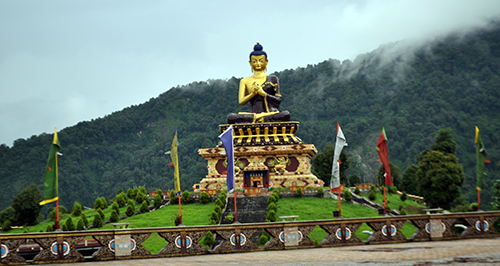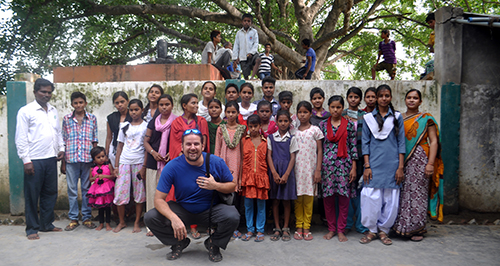For the second time in less than a decade, Peace and Conflict Studies (PCS) Associate Professor Dr. Jeremy Rinker received a Fulbright U.S. Scholar Program Award. Rinker, a professor at UNC Greensboro since 2015, plans to return to India, where he went in 2013 when he received his first Fulbright. This 2022-23 Fulbright was awarded for Rinker’s project, Trauma-Informed Frameworks for Inclusive Peace.

Rinker will be in Pune, in the western state of Maharashtra, between February and June 2023. He aims to outline what inclusive peace would look like in a complex heterogeneous society with competing identities and communities.
In developing a trauma-informed lens for both understanding and nonviolently engaging social exclusion, Rinker’s research work aims to map potential solidarities among anti-caste social justice and rights-based social movements.
A Fulbright is a prestigious award given to people at varying levels of their careers, and may include students, teachers, artists, scientists, or scholars.
During Rinker’s return to India, he will be teaching and researching about caste dynamics of conflict in the country. His interest in India and caste conflict stems from graduate school, when a professor taught him about the socially engaged Buddhism of Dr. Bhimrao Ambedkar, a social reformer and political leader in India, who pushed for low caste representation and dignity. Ambedkar, who is relatively unknown in the United States, is more popular than Mahatma Gandhi in India.
Rinker has been to India several times to study caste conflict and to explore what can be done to overcome its’ traumatic legacies.
It’s a much older system of oppression than the racial oppression here (in the U.S.).
In India, the caste system still impacts everything from who you can marry, what food you can eat, what jobs you can work, and even – in some parts of the country – if you’re allowed to wear shoes inside the village proper. Caste can carry over into the economic and criminal justice systems, as well.

Jeremy Rinker visiting school in Banaras
While Rinker is in Pune, he’ll be associated with Symbiosis University’s Center for International Education (SCIE), a four-year, private liberal arts university. He will teach conflict resolution and a sociology course on caste, as well as conducting focus groups, interviews, and archival research on trauma-informed care and conflict.
He’s hoping to connect trauma awareness and caste with his teaching and research while in India.
When Rinker was in India in 2013, he spent time with the People’s Vigilance Committee on Human Rights, which works to prevent the exploitation of marginalized groups in India.
After that experience, I better understand how trauma impacts a collectivity, how these collectivities are organizing resistance, and the complexities of dealing with the transgenerational trauma of being discriminated against as a lower caste.
He plans to incorporate the research he gathers while in Pune in a new book he’s authoring on the role of trauma and emotions in conflict transformation practice.
See the full list of UNCG recipients through the years.
Story by Sarah Newell, HHS Communications.
Photos courtesy of Dr. Jeremy Rinker.